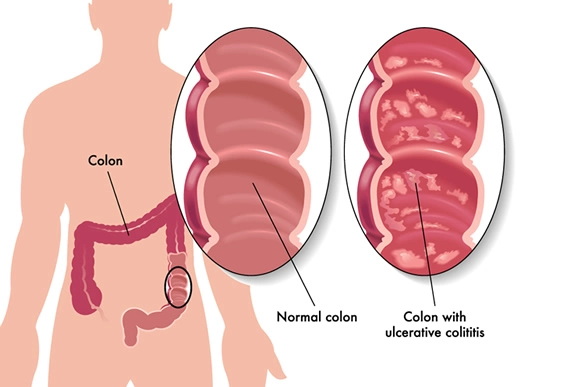Unraveling the Complexity of Ulcerative Colitis: Understanding its Impact and Navigating the Journey to Wellness
Ulcerative colitis, classified as chronic inflammatory bowel disease, affects millions of individuals worldwide. This condition demands a comprehensive understanding of its nature and the potential seriousness it carries. In this article, we delve into the intricate aspects of ulcerative colitis, exploring its symptoms, disease progression, potential complications, available treatment options, long-term prognosis, and the importance of proactive management. By empowering individuals with knowledge, we aim to shed light on this condition and guide them towards a path of wellness and improved quality of life.

Read Also: Water Whirls Nyt Exploring the Enchanting Mysteries of :The Hidden Beauty Beneath of 2023
Understanding Ulcerative Colitis: Symptoms and Impact
Ulcerative colitis is characterized by the inflammation of the colon, resulting in a range of distressing symptoms. These may include recurring abdominal pain, persistent diarrhea, rectal bleeding, weight loss, fatigue, and a decreased appetite. The impact of these symptoms on daily life can be profound, leading to physical discomfort, emotional distress, and restrictions on personal and professional activities. However, it is important to note that the severity of symptoms can vary from person to person, with some experiencing milder forms of the disease.
Read Also: Reduce Cholesterol Levels: Debunking and Destroy Common Myths and Misconceptions in 2023
Unraveling Disease Progression and Potential Complications
Ulcerative colitis follows a chronic and unpredictable course, characterized by periods of symptom flare-ups and remission. The disease can progress in severity over time, impacting the overall health and well-being of individuals. Understanding the potential complications associated with ulcerative colitis is crucial. These complications may include the development of ulcers and inflammation within the colon, bowel obstructions, severe rectal bleeding, perforation of the colon, and an increased risk of colorectal cancer. It is important to note, however, that not all individuals with ulcerative colitis will experience these complications.
Read Also: Owala Water Bottle Designed for Convenient Performance:Unleash Your Hydration Potential in 2023
Effective Management and Treatment Options
Fortunately, numerous management and treatment options exist to control and alleviate the symptoms of ulcerative colitis. Medications such as anti-inflammatory drugs, immunosuppressants, corticosteroids, and biologics are commonly prescribed to reduce inflammation and regulate the immune response. Lifestyle modifications, including dietary adjustments, stress reduction techniques, regular exercise, and adequate rest, can also contribute significantly to symptom management. In severe cases or when conservative treatments fail, surgical intervention may be necessary to remove the colon and rectum, providing long-term relief.
Read Also: Dog Ear Cleaner the Ultimate Buying Guide: Choose Wisely, Love Your Pet Dearly in 2023
What is Stage 4 ulcerative colitis?
Term “Stage 4 ulcerative colitis” is not commonly used in clinical practice or medical literature to classify the severity or stages of ulcerative colitis. Instead, healthcare professionals typically use a different classification system to assess the severity of the disease and guide treatment decisions. The most commonly used classification system is based on the extent of inflammation and severity of symptoms.

Ulcerative colitis can be classified into several categories, including:
- Mild to moderate ulcerative colitis: In this stage, the inflammation is typically limited to the rectum (proctitis) or extends to the sigmoid colon (proctosigmoiditis). Symptoms may include diarrhea, abdominal pain, and blood in the stool.
- Moderate to severe ulcerative colitis: In this stage, the inflammation typically affects a larger portion of the colon, extending beyond the sigmoid colon. Symptoms may include more frequent bowel movements, urgency, and severe abdominal pain.
- Severe ulcerative colitis: This stage involves extensive inflammation throughout the entire colon. Symptoms are typically severe, including frequent bowel movements (often with blood or pus), severe abdominal pain, fever, and weight loss. Severe cases may require hospitalization and immediate medical intervention.
- Fulminant ulcerative colitis: Fulminant colitis is a severe and potentially life-threatening form of ulcerative colitis. It involves intense inflammation throughout the entire colon and can cause complications such as toxic megacolon (severe dilation of the colon), perforation of the colon, or severe dehydration. Emergency medical treatment, including hospitalization and sometimes surgery, is often necessary in these cases.
It’s important to note that the severity and progression of ulcerative colitis can vary greatly among individuals. Treatment options for ulcerative colitis aim to control inflammation, relieve symptoms, and achieve long-term remission. If you or someone you know is experiencing symptoms of ulcerative colitis, it is advisable to consult with a healthcare professional for an accurate diagnosis and appropriate management.
Prognosis and Long-Term Outlook: Factors and Considerations
The long-term outlook for individuals with ulcerative colitis is multifaceted and dependent on several factors. Disease severity, response to treatment, overall health, and lifestyle choices all play vital roles in determining the prognosis. Achieving and maintaining periods of remission is a primary goal in managing ulcerative colitis effectively. With diligent adherence to treatment plans, regular monitoring, and proactive self-care, many individuals can lead fulfilling lives, minimizing the impact of the disease on their daily routines and overall well-being.
Read Also: Best Peanut Butter Whiskey : The Unexpected Twist Your Whiskey Collection Needs! in 2023
The Importance of Patient Education and Support
Education and support are integral components in the journey towards managing this. Empowering individuals with comprehensive knowledge about their condition equips them to actively participate in their care, make informed decisions, and advocate for their well-being. Engaging in patient support groups, counseling, and seeking emotional support from friends, family, or healthcare professionals can alleviate the psychological burden associated with living with a chronic illness. Recognizing that they are not alone in their struggles can provide a sense of reassurance and resilience.
Read Also: Gorilla Mind From Average to Alpha: Transform Your Mindset in 2023!
Conclusion: Navigating the Path to Wellness
Ulcerative colitis, though a complex condition, can be managed effectively with proper care, treatment, and support. By understanding its symptoms, potential complications, treatment options, and long-term outlook, individuals can navigate the path to wellness with confidence. Collaboration with healthcare professionals, maintaining a proactive approach to self-care, adhering to treatment plans, and seeking emotional support are essential elements in achieving remission and regaining control over one’s life. Remember, knowledge is the key to empowerment, and by arming ourselves with information, we can overcome the challenges posed by ulcerative colitis and embrace a future of improved well-being and vitality.




